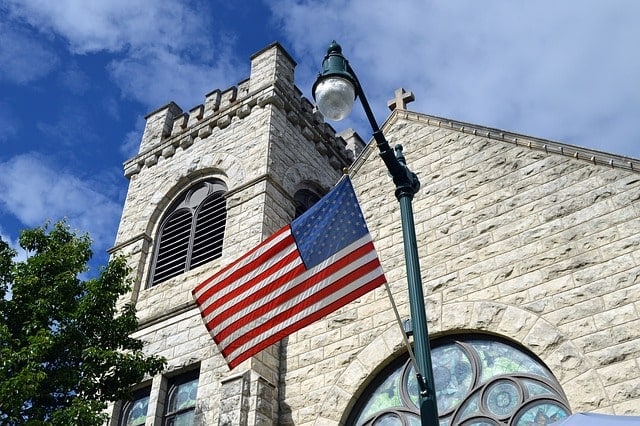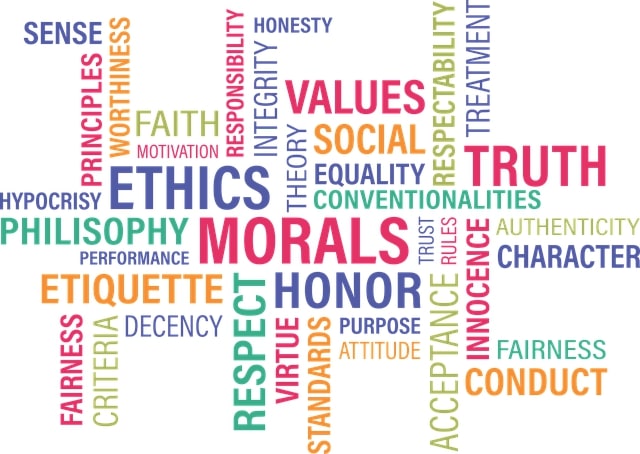As both a Christian and an American, I firmly believe in the separation of Church and State. Please hear me out.

We are nearing Thanksgiving in the U.S. and are surrounded by reminders of the Pilgrims sitting down with their new neighbors to give thanks for surviving to that point. It’s easy to forget why they were here in the first place: to escape religious persecution. Neither Roman Catholic nor Church of England (England’s breakaway from Rome), the Pilgrims were one of many sects of Puritans who had disavowed the state-approved religions of their time.
Puritans, Quakers, Calvinists and Jews also sought religious freedom, alongside Lutherans, Dutch Reformed and the Catholics and Anglicans who came to populate the colonies, whether by choice or conscription.
When our Founding Fathers were debating the Constitution, they were very cognizant of this diverse background and the often rancorous relationships that existed between these groups. They included language in the Bill of Rights accordingly, specifically prohibiting laws to establish a state religion and prohibiting laws against the free exercise of religion. This was important, as some colonies at the time already had “official” churches.
In the 2+ centuries since, we have continued to struggle with this concept of separation.
On the one hand, we have those who advocate against anything that has religious connotations, regardless of the historical record. So they protest against the Ten Commandments at courthouses, even though our modern concepts of law are so obviously built upon them and the earlier Code of Hammurabi. Whereas some places may have overly emphasized certain religious symbols over others, efforts against any symbols smack of prohibitions (also unconstitutional). Should we rename all municipalities that begin with St., San or Santa?
On the other hand, we have those who keep trying to make the U.S. into a Christian theocracy which it was never meant to be. This can probably be traced to those very Protestant groups who fled the persecution of England only to establish civil law according to their moral interpretation — in true human fashion. Remember how easily one might be put into the stocks or even declared a witch?
In my lifetime, the newest attempt to re-create the nation into a theocracy might be traced to the 1960s (give or take).
This era gave us Vietnam, the Cold War, hippies, civil rights protests, Watergate. It also gave us the Charismatic Movement, Jesus People, and a resurgence of Apocalyptic teaching. Hal Lindsey’s The Late Great Planet Earth may have been the seminal work for this last. Everyone in Christian circles seemed to be talking about the Rapture, some predicting it would arrive by 1988. (Yeah, it didn’t.)
Part and parcel with this apocalyptic attitude was a profound need for Israel to acquire and keep control of Jerusalem. How else would the Jewish Temple have a chance to be rebuilt and usher in the Second Coming of Christ? (Whether the Rapture came before, after or not at all wasn’t quite as important.)
That’s right. The support for Israel from Christian circles had (has) little to do with repatriating the Jewish Diaspora and almost everything with hastening the End Times.
This was evident when I visited that land in 1977. Then (and to this day), Arab Christians lost their lands, their livelihoods, their children, as the Israeli government sought to secure that land from Arab families who had lived there for generations. True, most Arabs were Muslims. Most who brought arms against the Israelis were supported by Egypt, Syria, and others. But the Israelis didn’t try very hard to distinguish between groups. And the PLO, etc., repeatedly attack Israeli forces from Arab Christian villages and homes, knowing they will be wiped out in retaliation. And most American Christians remain blissfully ignorant.
Debating foreign policy isn’t my goal here; I just want to point out that conducting such policy from a “Christian” perspective can be misleading in the least, and usher in World War III at the worst. Which is more important: establishing and maintaining a homeland for the Jews, or supporting fellow Brothers and Sisters in Christ?
When we, as Christians, try to influence foreign policy from a rather narrow theological viewpoint, such cognitive dissonances start to spring up.
But let’s return to the home front.
The upheavals of the 1960s and following created a lot of change and a lot of fear. Issues of race, gender, gender roles, authority and religion all were challenged in one or more ways. Mainline Christian churches took a big hit in membership. Conversely, churches offering “alternative” worship, cults, non-western religions and anything non-organized (i.e. agnosticism and atheism) gained traction.
Christianity, in general, seemed to be losing ground. But certain parts, namely the Evangelicals (Fundamentalist Right), became stronger — or at least, became increasingly vocal. Many different studies show that humans become more conservative in their thinking when they feel threatened, and the Christians of the far right capitalized on this, consciously or not. (This same dynamic is what cult leaders count on: emphasis on authority, rules, conformity.) We humans tend to be lazy thinkers, and when under stress, it’s nice to have someone tell us what to do.
The problem is, the Fundamental Right wants to legislate morality to their standards.
What does “Family Values” mean? If you say, “A man married to a woman, and the children they create,” it sounds all nice and Traditional. Ideal. Everyone should be able to buy into that, right? But what if—
—What if they can’t have children?
—What if the husband (or wife) is abusive?
—What about adulterers?
—What if there aren’t enough women around for every man?
—What if there aren’t enough men around for all the women?
—What if the man really likes men and can’t stand women (or vice versa)?
—What if they have a big family that they can’t support?
The reality is, the “Ideal” is out of reach for many. And it always has been.
My German great-great-grandmother, the result of a passionate farewell, had to be adopted by her biological father several years after she was born out of wedlock, so she could go back with him and her family to the U.S. Another great-grandmother was divorced and remarried by 1883. (That second marriage lasted 75+ years.) Within the five to six generations since, there have been: divorces, annulments, adoptions (in and out), children in and out of wedlock, gays and lesbians, single parent families, blended families, bi-racial and multi-racial families.
So “Family Values” probably means something quite different to me than to Dr. James Dobson and the Family Research Council.

What our Founding Fathers realized — and what we have forgotten — is that you can’t legislate morality, per se. [Note: there are various definitions of values, morality and ethics in current usage. I’m going to use a synthesis of those words as defined on YourDictionary.com and DifferenceBetween.net.]
Our values are the internal beliefs we use to determine good and bad, right and wrong. Our morals, however, are more the application of those values in our interactions with others.
Conflicts often occur: a woman values honesty, but she can’t afford the money for medicine to save her baby. She has the opportunity to steal some medicine; what should she do? Many parents would agree it’s wrong because it’s theft, but internally realize they’d do anything to save their own baby. I don’t know what the actual split is between steal/don’t steal, but I know it’s there. Everyone’s hierarchy is different, and how they influence our morals and ethics is different.
When we make laws, they are usually based on generally accepted moral standards. But we have courts and juries, because we realize that laws aren’t perfect, there are often unclear or extenuating circumstances, or that what one considers evidence of wrong is nothing to another. And standards change.
There was a time when adultery was punishable by stoning. Gradually, western culture has accepted that adultery is common and relegated punishment to the civil courts, if at all. Even those who rail against it as immoral have succumbed. Remember Jimmy Swaggart and Jim Baker?
Today, we have the disconnect of many Christians who claim conservative values and morals supporting leadership which has a proven track record of flaunting accepted ethics, simply because he or she talks a good talk. But I ask you:
- Why should anyone believe a sermon against greed from someone driving luxury cars, while his own parishioners and neighbors are on food stamps?
- Why should anyone believe someone really cares about families, when they support policies that separate or otherwise harm them?
- Why should anyone believe someone cares about morality, when they support a politician whose morals are flexible to his own desires, even to the extent of flaunting the morals of that supporter?
- Why should I accept someone telling me “this is the Christian position” on a political or social issue, when they so blatantly ignore other Christian values? (Yes, that one’s personal.)
It’s very human to look at single issues, to paint morals to our own narrow perceptions, to try to legislate people to believe exactly like we do, to support policies that we feel are favorable to our lives over those that favor people not connected to us. But whose values would rule? Especially when “Do as I say, not as I do” has become the norm?
That is what makes keeping church and state separate so important. The state must be obligated to all of its citizens.

As it is now, our nation is strengthened by a rich diversity of religions and cultures. The Amish and others dress as they wish. Some people go to church on Saturday, others on Sunday; Jews worship according to their traditions, as do Hindus, Muslims, and Buddhists; Wiccans celebrate the Solstice. Others declare no affiliation. People marry and divorce pretty much as they choose. For those of you who haven’t traveled much, this is NOT the worldwide norm.
Today, the hot buttons are abortion and LGBTQ+ rights. It isn’t my intent to discuss them here, but let me ask: Are you willing to fund the medical care for, love and raise up the result of every unwanted pregnancy? Already political conservatives are working to cut back food and medical aid to children, not to mention access to contraception and adoption. And if being homosexual or anything other than heterosexual is immoral (I’m not saying it is), how is that different than having an affair? Or stealing from your employer — or congregation?
We have been brainwashed into thinking our nation was once something it never was. Norman Rockwell painted ideals, not realities. Our forefathers were wise beyond their time in their attempt to keep church and state separate.
I am proud to be an American; I am a Christian by the grace of God. Even Jesus made the distinction between the two types of membership when presented with the Roman coin.
If we, who call ourselves Christians, want to live in a nation that honors “Christian” values and morals, then we need to live our lives according to those values first. Feeding the poor, caring for the sick, the widows and orphans, the immigrants, the dispossessed. Not judging others but giving them honor and respect. Doing all things from Love. Pretty much all major world religions — and most minor — would be on board with those.
Good article and good points. Thanks for posting.
Thank you, Jim. It was hard to keep it from getting too big.
Just this morning a meme appeared in my FB feed that read:
There was once a time when the President was honored
Police were respected,
Newborns were treasured,
Veterans were revered,
And God was worshiped.
Let’s bring that back….
Pretty pink background with butterflies and a red heart with a flag.
I wanted to comment, “And which planet was this on?” But I refrained. I’ve tried logic on her before, but she is an ardent anti-vax, anti-gay, now going on some weird lifestyle diet, and very pro-Trump. Sadly, history is a highly redacted page for those who only see one viewpoint.
There’s a reason I don’t post my blog to FB.